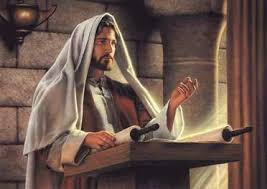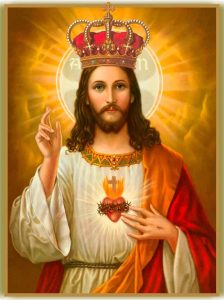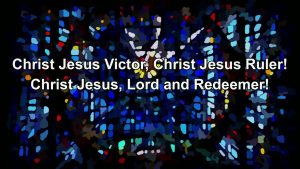 When the Liturgy Committee chose the prayer intention for this particular week, we opted to highlight in a particular way our Oblates, especially tomorrow on our quarterly Oblate Sunday. However, given our community’s historical contribution to Catholic education, it seems important that we not overlook the fact that it is also national Catholic Schools Week with its theme: “United in Faith and Community.” And, what a happy coincidence it is that it blends with the Gospel story of Jesus’ first teaching assignment. As Jesus stands in the synagogue to read from the scroll handed to him the words of the prophet Isaiah: “The Spirit of the Lord is upon me. I have been anointed to bring glad tidings to the poor, to proclaim liberty to captives, sight to the blind, freedom to the oppressed and to proclaim a year of acceptable to the Lord.” Then, “Rolling up the scroll, he handed it back to the attendant and sat down.”
When the Liturgy Committee chose the prayer intention for this particular week, we opted to highlight in a particular way our Oblates, especially tomorrow on our quarterly Oblate Sunday. However, given our community’s historical contribution to Catholic education, it seems important that we not overlook the fact that it is also national Catholic Schools Week with its theme: “United in Faith and Community.” And, what a happy coincidence it is that it blends with the Gospel story of Jesus’ first teaching assignment. As Jesus stands in the synagogue to read from the scroll handed to him the words of the prophet Isaiah: “The Spirit of the Lord is upon me. I have been anointed to bring glad tidings to the poor, to proclaim liberty to captives, sight to the blind, freedom to the oppressed and to proclaim a year of acceptable to the Lord.” Then, “Rolling up the scroll, he handed it back to the attendant and sat down.”
But Jesus did not simply sit down, fold his hands and meditate. That morning in the synagogue He follow the protocol: one stands to read the scriptures and sits to teach. In many places in Scripture you will read that Jesus did just that: He sat to teach the people. Remember in the boat they pulled out from the shoreline? On the hillside where he delivered the Beatitudes? And at table with his disciples for their last meal together? This practice of “stand to read”, “sit to teach” is a great model for teachers. It exemplifies the saying; a teacher should be a guide at the side not a sage on the stage. Jesus sat, gazed at the people and in all humility made an astonishing statement, “Today this Scripture passage is fulfilled in your hearing.”
What did this message mean to the people in the synagogue? What does it mean to us today? It meant that day what it means today: that Jesus is the promised Messiah, the anointed one sent by God to redeem his people. He came then, and He continues to come every day to set us free. Why do we continue to try to solve our problems by ourselves instead of turning to God?
As we look ahead to 2025 we might consider how we can make the focus of Jesus’ ministry which included bringing glad tidings to the poor, liberty to captives, sight to the blind, healing to the sick, freedom to the oppressed, and proclaiming a year that is worthy, acceptable to the Lord, a reality.
This gospel challenges us to stretch out our hands in practical solidarity to those who are visibly disadvantaged – to be concerned not only with saving people’s souls but also with saving their bodies, their health, their housing and their jobs. So, we ask ourselves: Who are the blind, the poor, the captive, the oppressed? Look close to home, then to our neighborhood and to those who depend on us in unsuspecting ways?
We can’t cure every problem, but we can do something. Each one of us, individually and as a community, can question: How can we think globally and act locally? We can decide how to nourish our minds and feed our spirits by choosing what to read and to watch, what to reflect on. And, we can protect our minds and spirits by not reading or watching what does not uplift us and make a positive impact on our lives and on those we engage in conversation. Like Scholastica and Benedict on that memorable night, we want to spend time in “holy conversation.” What can we do for each other, one on one? How can our lives, our presence, our way of life, bring relief and aid to the local community? How can we ensure that the year ahead will, in truth and fact, be a “year acceptable to the Lord?”
Sometimes we forget how precious and powerful the Word of God is. A powerful example is in this true story. In 1964 the Romanian government released religious and political prisoners. Among them was one who had spent nearly three of his fourteen years in prison in solitary confinement. After his release, he wrote a book entitled In God’s Underground in which he describes how one day a new prisoner was brought in. The upper part of his body was in a plaster cast. When the guards withdrew, he slipped out a small, tattered book that was secretly hidden between his skin and the plaster cast. None of the other prisoners had seen a book for years. They asked him what the book was. It was the Gospel of John. The author of the story writes that he took the book in his hand and no life-saving drug could have been more precious to him. From that day the tattered little book went from hand to hand, many learned it by heart and each day they would discuss it among themselves. That reminds us that all too easily we can forget (or dilute) the importance of the Word of God in our lives.
~Reflection by Sister Roberta Bailey, OSB






